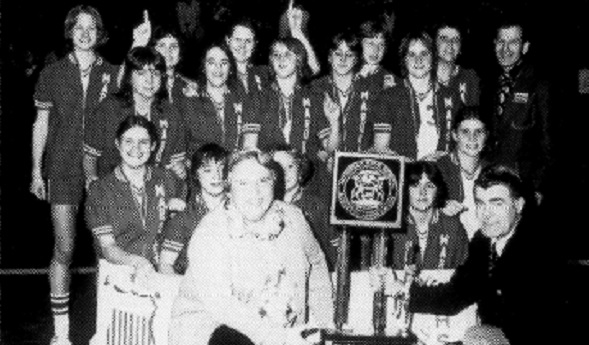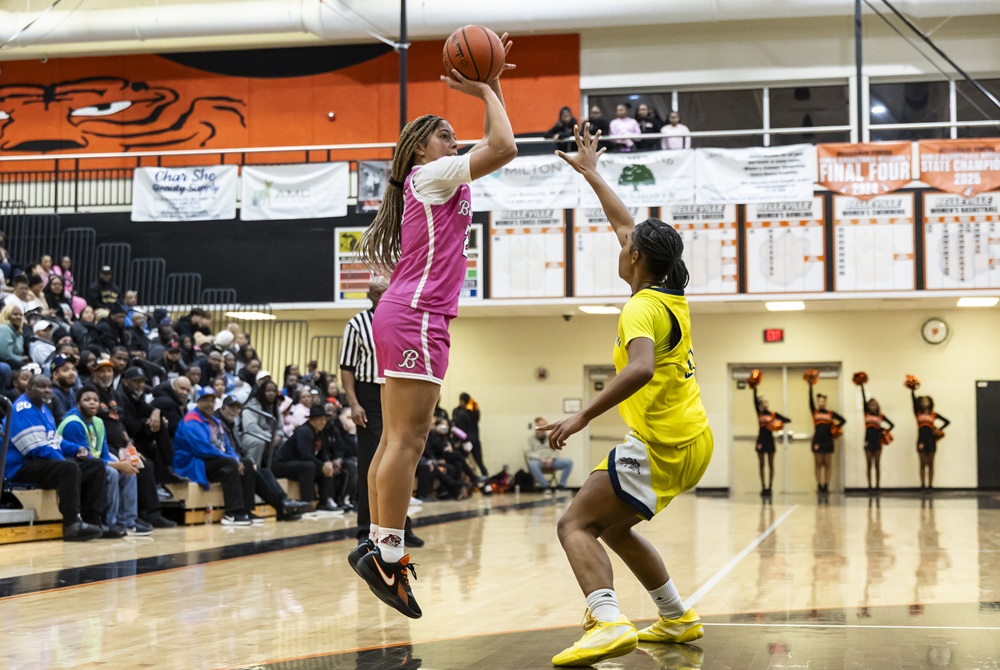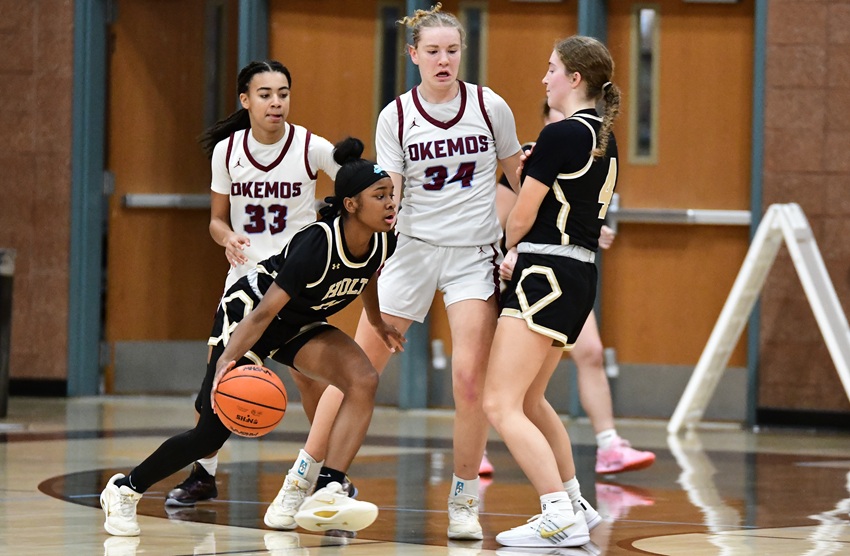
#TBT: Redettes Bring Home Class A Title
March 31, 2016
The following tells the story of the 1976 Marquette girls basketball team, still the only Upper Peninsula team to win an MHSAA Class A girls basketball championship. This piece, by MHSAA historian Ron Pesch, served as the story behind the ceremony from a “Legends of the Games” program celebrating the Redettes.
If you never have dreams, they can never come true.
For coach Barb Crill and the girls basketball team from Marquette, the dream was to win an MHSAA basketball crown.
“Barb said to us as incoming freshmen that we would win the state,” said Karen Levandoski Helmila, recalling her days as a Redette.
The girls had come close early in Crill’s tenure. In three years, Crill's squads had compiled a 52-4 record, including a 16-2 mark in 1973, a 19-1 record in 1974 and 17 straight victories the following year.
In 1974, Grand Rapids Christian eliminated the Redettes in the Regional Final. In 1975, the team averaged 68 points a game to 25.9 for the opponents. In the MHSAA District Final, Marquette downed Sault Ste. Marie, 109-16, then brushed aside Portage Central, 72-18, in the Class A Quarterfinals. However, the voyage ended abruptly in the Semifinals with a loss to Farmington Our Lady of Mercy, 62-57.
The nucleus was in place for another run at the title in the fall of 1976. The team had lost all-U.P. players Jean Moratti and Laurie Niles, but had strong replacements. The Levandoski twins, Karen and Kay, Cheryl Aho, Janet Hopkins, Sue Belanger and Caron Krueger were all seniors, and Katie Miller, a senior transfer from Eau Claire, Wis., had joined the team. Forward Shelly Chapman, a junior, also had won all-U.P. honors. Sophomores Cynde Cory and Chris Moran were expected to be the first off the bench. Sue Micklow, Kate Jennings, Lisa Coombs, Mary Erspamer, Cathy Niles and Sue Lakanen rounded out the squad. Karen Meyers, the leading scorer on Northern Michigan University's basketball team and former Redette, was returning for her fifth year as Crill's assistant.
But time was running out for the squad to achieve their coach's prophecy.
“Over the years we had played every good team in the U.P.,” said Crill. “The girls needed more.”
So on Labor Day weekend, 1976, the Redettes prepared for a trip to Detroit – their coach's old stomping grounds. Crill had arranged scrimmages against some old friends in the Motor City; among them Detroit Dominican, coached by Sue Kruszewski and winner of the Class A title in 1973 and 1974, and Harper Woods Bishop Gallagher, which had made it to the Quarterfinals in 1973.
The Marquette squad responded to the challenge, playing well in the workouts.
“The girls came back in shape from summer vacation,” Crill told the media after the trip. “Most had done a lot of work on their own, while others stayed active playing other sports.”
A native of Allen Park, Crill had started coaching and teaching in Ann Arbor Public Schools in 1959. She instituted Marquette's girls program during the 1969-70 season. “We started here before there was any MHSAA (sanctioned) ball,” said Crill. “The girls provided their own uniforms. The principal, Paul Kotila, provided a bus and driver. We played everyone with a team. It promoted a lot of the interest.”
Back in the U.P., it was business as usual. In the home opener, Marquette trounced Gladstone, 71-19, as 14 girls saw time on the court. Next, they downed Negaunee, 87-21.
Through 17 additional regular-season games, the result was the same. Omitting a 2-0 forfeit by Harbor Springs, the Redettes improved their average from 1975 to 80.8 points per contest, while decreasing their opponents’ average to 25.2 per game.
The squad dumped Escanaba, 71-29, before a crowd of about 100 for the District title at Escanaba. Shelly Chapman led the team with a season-high 33 points. In Grand Rapids for the Regionals, the Big Red Machine defeat Benton Harbor, 64-55. Leading at the half by 25 points, Crill went to the bench. Again, Chapman led all scorers with 21 points, while Krueger added 16 and Hopkins added 13.
In the Regional Final, the Redettes faced a taller Grand Rapids Union squad. Despite the partisan Union crowd and a slim three-point lead at the end of the third quarter, Marquette pulled away for a 48-34 win.
With another victory in the bag, the Redettes congratulated one another in a familiar postgame scene during the 1976 championship run. True to her words, Crill and her Marquette cagers would have a season to remember and scrapbooks to compile following their impressive run to the MHSAA title. In the Quarterfinals, the team defeated Lansing Eastern, 67-37, then disposed of Flushing, 62-46, in the Semifinals. All that remained was a rematch with Farmington Our Lady of Mercy.
This time Marquette would not be denied, downing the reigning champs, 68-41. Chapman finished with 23, Hopkins poured in 19, and Krueger hit for 14 as Crill's starting five went the entire game without a substitution.
“I was impressed with the ladies’ positive attitude as we prepared for the championship game,” said Crill, reflecting on the matchup. “They seemed quiet, very determined, very patient with one another and quite business like. I had coached many games by the fall of 1976, but I never remember another game where we planned together what to do to win, and they followed our plan perfectly.”
The team was the first Class A school from Michigan's Upper Peninsula to win an MHSAA basketball championship, a feat that has not been repeated since.
“The strength that our team held through the entire game was so strong,” said Aho Reynolds. “That's the way I felt. The more baskets we made the more we wanted. The offense and defense combined everything that night.”
“The crowd was so large for the Final game,” recalled Levandoski Helmila. “There were thousands of people watching and it seemed like only 50 cheering for us. We were glad to face the team that knocked us out of the tournament the year before. We worked together for so long to reach our goal.”
“We wanted that victory not only for the members of the team, but for our coaches, parents and community,” echoed Levandoski Angeli. “We were not only a team, but a family. Our coaches made it clear and instilled in us that no individual was a star alone.”
“Wow! It was fun,” said Hopkins, “a great ending to four years of high school basketball. We dominated the game. We were the underdog, yet we were confident and played to our strengths. Each year I played, the team improved its skill level. In my senior year everything came together and we were unstoppable! Each team member contributed to the outcome, whether it was during practice, or a game. We were focused and determined to succeed.”
“Cheryl Aho's incredible defense stands out in my mind,” remembered Coombs Gerou. “She stopped one of the leading scorers in the state. Our team defense really stood out. “Everyone played, and on any given night someone off the bench would score as much as someone who started. We all treated each other with respect and worked together as a team. Coach Crill taught me that anything was possible if you worked and prepared for it.
“Another memory was our singing on the bus, even those of us who couldn't carry a tune.”
It was one of the longer bus rides that set the foundation for that championship year.
“I think that trip (to Detroit) was the biggest difference,” said Crill. “It gave them more experience playing the type of teams they would meet in the tournament. They could see they were talented enough. They had already played the best there was. They realized they could beat them again.”

Breslin Bound: 2025-26 Girls Report Week 10
By
Geoff Kimmerly
MHSAA.com senior editor
February 17, 2026
Three months of Michigan high school girls basketball results are soon to be poured into the sorting of 128 District brackets, which will be published Sunday on the Girls Basketball page after teams are seeded based on their Michigan Power Ratings this winter.
A week’s worth of games certainly still can make a difference, and there are plenty of matchups coming up that could tilt how teams line up at several locations. Follow along on the MPR page and see below for some of what we’re watching as we move toward one of the most highly-anticipated days of the season.
“Breslin Bound” is powered by MI Student Aid and based on results and schedules posted for each school at MHSAA.com.
Week in Review
The countdown of last week’s five most intriguing results:
1. Belleville 56, Wayne Memorial 54 The Zebras (15-2) made this much closer than Belleville’s 28-point win in their first meeting, but the Tigers (20-0) still prevailed to clinch the Kensington Lakes Activities Association East title.
2. Jackson Lumen Christi 48, Orchard Lake St. Mary’s 36 The Titans (15-2) claimed the Catholic High School League Bishop Tournament championship, adding to their CHSL Central East title by downing the CHSL Central West champion Eaglets (15-3).
3. Detroit Renaissance 63, Detroit Mumford 37 The Phoenix (15-2) finished an undefeated run through the Detroit Public School League with a second win this winter over Mumford (8-8), this time in the PSL Tournament championship game.
4. Mio 50, Au Gres-Sims 46 These North Star League Little Dipper rivals played each other twice in four days, Au Gres-Sims (16-3) winning the first matchup 53-46 before Mio (14-4) took this one; both have just the one loss, to each other, in league play.
5. Brooklyn Columbia Central 59, Hanover-Horton 52 (OT) Columbia Central (15-2) earned a one-game edge atop the Cascades Conference West with these two set to meet again tonight and Hanover-Horton (15-3) playing to secure a share of the title.
Watch List
With an eye toward March, here are two teams in each division making sparks:
DIVISION 1
Muskegon (15-2) The Big Reds have clinched the Ottawa-Kent Conference Green championship with two league games to play and after finishing third and 11-12 overall just a season ago. Muskegon certainly is a contender statewide in Division 1 as well with wins over Rockford (16-1) and Hudsonville (12-7) and losses to only Wayne Memorial (15-2) and Grand Haven (16-2) – the latter by just a point. Haslett (15-2) and Holt (14-3) are league champions and will provide two more solid prep games heading into the postseason.
Saginaw Heritage (15-5) The Hawks have won four straight to clinch the outright Saginaw Valley League North championship after finishing second in the one-division SVL a year ago. Heritage also has moved up to No. 3 in statewide Division 1 MPR with its success coming against opponents with a combined .688 winning percentage and the five losses to teams that all have at least 13 wins. The team’s final two regular-season games are against league champions – Flint Powers Catholic (18-2) and Yale (17-1).
DIVISION 2
Grand Rapids West Catholic (14-4) Last season’s Division 2 runner-up can’t catch Grand Rapids South Christian in the O-K Gold but still has plenty of chances to make noise this season and plenty of quality wins showing what’s possible – including victories over reigning champion Tecumseh (17-2), Saginaw Heritage (15-5), Parma Western and Wyoming (both 13-5). Two of West Catholic’s losses came to the undefeated Sailors, with the others to Muskegon (15-2) and Middleville Thornapple Kellogg (10-7). Thursday’s matchup with Grand Rapids Catholic Central (16-2) should be especially interesting heading into seeding.
Redford Westfield Prep (12-5) The Warriors defeated Hamtramck on Friday to win the Charter School Conference Tournament, and they have only one loss this season to an in-state school – Riverview (15-4), by a point – with the other four coming against opponents from Chicago. All but an earlier win over Hamtramck came by double digits, and Westfield went from defeating the Cosmos by two on Jan. 30 to 22 last week. Tonight’s matchup with Milford (14-4) highlights the final weeks of the regular season.

DIVISION 3
Hemlock (17-1) The Huskies are enjoying another dominating run in the Tri-Valley Conference Blue, carrying a 37-game league winning streak into this week as they seek to clinch a fourth-straight title Friday against second-place Saginaw Michigan Lutheran Seminary. Hemlock has five wins over opponents with at least 12 victories this season, including by 20 points the first time it faced MLS (14-4) and more recently over Beaverton (16-2) on Feb. 9. The lone loss came to Division 2 Freeland (12-6). The Huskies will head into the postseason seeking a second-straight District title.
Kalamazoo Christian (13-3) The Comets clinched a share of the Southwestern Athletic Conference Valley title Friday with a 35-33 win over Schoolcraft and can make the championship outright against Lawton this Friday. The league crown is K-Christian’s fourth-straight, and the Comets will head into the postseason seeking at least a fourth-straight District title. The only losses came against Division 1 and 2 opponents that are a combined 42-12. They see second place Hackett Catholic Prep (15-3) one more time Feb. 24 and could see the rival Irish as well in the District.
DIVISION 4
Ewen-Trout Creek (16-2) Last season’s Division 4 runner-up has played like a contender again, with a six-point loss to Division 2 Negaunee (17-1) just like last winter and also one against L’Anse (15-2), but with wins over Baraga (16-3), Norway (14-4) and Wakefield-Marenisco (12-5) twice – and with W-M likely to be the second seed in E-TC’s District in two weeks. Division 2 Houghton (13-5) on Feb. 24 will be another nice test heading into the playoffs.
L’Anse (15-2) The win over Ewen-Trout Creek noted above appears likely to decide the overall Copper Mountain Conference championship in favor of the Purple Hornets and came after they lost to E-TC by 24 a year ago. L’Anse did finish 18-6 last season so this progression may be just the next step, and they’ve shown it even during this winter avenging an early 12-point loss to Baraga with a 16-point win Jan. 29. The other defeat came to Division 1 Marquette, by just three points, also in mid-December.
Can’t-Miss Contests
Be on the lookout for results of these games coming up:
Friday – Grand Haven (16-2) at Rockford (16-1) – The Rams’ third game in four days this week could clinch them the outright title in the O-K Red, as they look to add to a 64-48 win over the second-place Buccaneers from Jan. 30.
Friday – Pewamo-Westphalia (14-2) at Bath (16-2) – The Pirates’ 37-game Central Michigan Athletic Conference winning streak will be on the line as they look to finish a repeat championship and after defeating Bath 64-41 on Jan. 15.
Friday – Morley Stanwood (15-2) at Kent City (15-4) – Morley Stanwood can clinch the Central State Activities Association White title outright, or Kent City can move into a first-place tie with one league game left for both.
Friday – Beaverton (16-2) at Standish-Sterling (17-1) – These two are set to meet in next week’s Jack Pine Conference championship game as well, but this matchup could provide a preview.
Saturday – Cascades Conference Championship at Spring Arbor – Grass Lake (16-1), Michigan Center (15-3), Brooklyn Columbia Central (15-2) and Hanover-Horton (15-3) all remain in the mix to reach this game.
MHSAA.com's weekly “Breslin Bound” reports are powered by MI Student Aid, a division within the Department of Lifelong Education, Advancement, and Potential (MiLEAP). MI Student Aid encourages students to pursue postsecondary education by providing access to student financial resources and information. MI Student Aid administers the state’s scholarship and grant programs that help make college Accessible, Affordable and Attainable for you. Click to connect with MI Student Aid and find more information on Facebook and X @mistudentaid.
PHOTOS (Top) Belleville’s Sydney Savoury (21) pulls up for a shot during her team’s 56-54 win over Wayne Memorial. (Middle) Holt’s Olivia Gadson (11) follow’s a teammate’s screen during the Rams’ 51-42 win over Okemos on Feb. 10. (Belleville/Wayne photo by KMS Photography. Holt/Okemos photo by John Johnson.)


